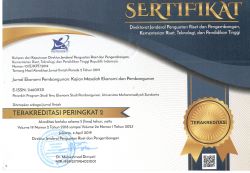An Empirical Study of The Linkage Between Education and National Output in Malaysia
Amierul Asraf Muhammad Amir Chan(1), Noorazeela Zainol Abidin(2*), Mohd Shahidan Shaari(3)(1) School of Business Innovation and Technopreneurship Universiti Malaysia Perlis
(2) School of Business Innovation and Technopreneurship Universiti Malaysia Perlis
(3) School of Business Innovation and Technopreneurship Universiti Malaysia Perlis
(*) Corresponding Author
Abstract
This study embarks on an investigation into the linkage between education and national output in Malaysia. Annual time series data on real gross domestic product (GDP), expenditure on education, fixed capital formation and labour force were collected from 1985 to 2018 and the Autoregressive Distributed-Lag (ARDL) method is applied in this study. The results of this study reveals that capital formation and education can cause higher national output in the long run. However, labour force does not have any connection with national output in the long run. Besides, the results also show short-run relationships. It is found that only capital formation has an influence national output in the short run but labour force and education do not have any effect on national output in Malaysia. Therefore, the government needs to increase its expenditure on education to boost national output. Other than that, the government must take other initiatives to increase expenditure on education.
Keywords
Full Text:
PDFArticle Metrics
Abstract view(s): 598 time(s)PDF: 504 time(s)
Refbacks
- There are currently no refbacks.
















